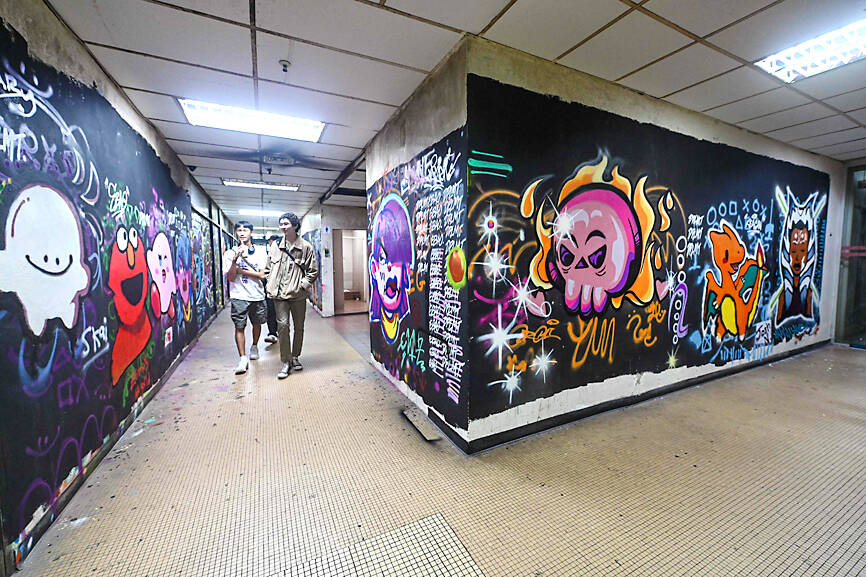In Singapore, where graffiti is banned, young creatives have taken over an abandoned mall, spray painting colorful murals and holding art workshops to bring the space back to life.
About half a century old, Peace Centre is scheduled to face the wrecking ball later this year, but fans say it has provided a rare space for self-expression.
Permission from authorities is required for any kind of street art in the Southeast Asian country.

Photo: AFP
In August last year, PlayPan, an initiative cofounded by entrepreneur Gary Hong (洪逸凡), convinced developers to postpone the mall’s demolition.
The answer the initiative’s backers received was that they could go ahead and use the space for “a social experiment to bring [the] community together,” Hong said.
They were given the space to host performances and workshops for several months, allowing artists, students, charities and small businesses to set up shop for free or at heavily discounted rates.
The eclectic mix of pop-up stores, art tours and musical performances has transformed the once lackluster mall into an unexpected art haven. However, at the end of this month, the mall is to close definitively, bringing an end to the art project.
Peace Centre was once a popular mall, but lost its shine to glitzier shopping centers that mushroomed over the past few years.
In the past two decades it was mostly known for its printing shops and seedy karaoke lounges.
Since its revamp into an art space, young people have attended graffiti workshops, coloring shuttered shopfronts with spray cans while punters browsed through second-hand clothing stalls and exhibits.
“It’s not something you do on a normal weekend, less so inside an indoor area, in a mall,” said Darryl Poh, a 29-year-old sales trader who took part in a spray-painting workshop.
The bathroom walls and mirrors were splattered with graffiti, while a Rage Against the Machine song blared from one of the pop-up stores. Craft cocktails were served on the ground floor and nearby, death metal CDs and trinkets were on sale.
Such spaces are uncommon in Singapore.
“I think you just got to know where to look. The government can curate things, but people are still going to do their own thing,” said Ning Fei, 34, who was selling typewritten poems.
The outer walls were plastered with flyers advertising activities from ukulele classes to pebble painting, while a futuristic mural welcomed visitors arriving at the main entrance.
Gabriel, a 43-year-old photographer who asked to be identified only by his first name, set up a booth to take portraits of passersby for charity.
“The energy here was really exciting. There were a lot of things you don’t typically see in Singapore malls,” he said, describing the vibe as “very non-Singaporean, very organic.”
“I’m going to miss this community very much. I’m glad to have plugged in and participated in this swan song,” he said.

Yemen’s separatist leader has vowed to keep working for an independent state in the country’s south, in his first social media post since he disappeared earlier this month after his group briefly seized swathes of territory. Aidarous al-Zubaidi’s United Arab Emirates (UAE)-backed Southern Transitional Council (STC) forces last month captured two Yemeni provinces in an offensive that was rolled back by Saudi strikes and Riyadh’s allied forces on the ground. Al-Zubaidi then disappeared after he failed to board a flight to Riyadh for talks earlier this month, with Saudi Arabia accusing him of fleeing to Abu Dhabi, while supporters insisted he was

The Chinese Embassy in Manila yesterday said it has filed a diplomatic protest against a Philippine Coast Guard spokesman over a social media post that included cartoonish images of Chinese President Xi Jinping (習近平). Philippine Coast Guard spokesman Jay Tarriela and an embassy official had been trading barbs since last week over issues concerning the disputed South China Sea. The crucial waterway, which Beijing claims historic rights to despite an international ruling that its assertion has no legal basis, has been the site of repeated clashes between Chinese and Philippine vessels. Tarriela’s Facebook post on Wednesday included a photo of him giving a

‘MOBILIZED’: While protesters countered ICE agents, Minnesota Governor Tim Walz activated the state’s National Guard to ‘support the rights of Minnesotans’ to assemble Hundreds of counterprotesters drowned out a far-right activist’s attempt to hold a small rally in support of US President Donald Trump’s latest immigration crackdown in Minneapolis, Minnesota, on Saturday, as the governor’s office announced that National Guard troops were mobilized and ready to assist law enforcement, although not yet deployed to city streets. There have been protests every day since the US Department of Homeland Security (DHS) ramped up immigration enforcement in the Twin Cities of Minneapolis and Saint Paul by bringing in more than 2,000 federal officers. Conservative influencer Jake Lang organized an anti-Islam, anti-Somali and pro-US Immigration and Customs Enforcement

NASA on Saturday rolled out its towering Space Launch System (SLS) rocket and Orion spacecraft as it began preparations for its first crewed mission to the Moon in more than 50 years. The maneuver, which takes up to 12 hours, would allow the US space agency to begin a string of tests for the Artemis 2 mission, which could blast off as early as Feb. 6. The immense orange and white SLS rocket, and the Orion vessel were slowly wheeled out of the Vehicle Assembly Building at the Kennedy Space Center in Florida, and painstakingly moved 6.5km to Launch Pad 39B. If the